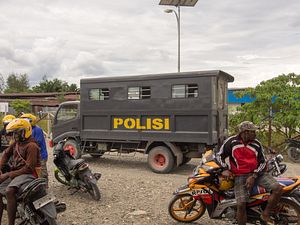Indonesia is cooperating with China to investigate an ethnic Uyghur suspected of plotting a suicide bombing, the head of Jakarta’s National Counter-Terrorism Agency told Reuters. Saud Usman Nasution said that several Uyghurs were believed to have joined up with Indonesia terrorist groups linked to Islamic State.
On December 24, Indonesian police reported that they had arrested an ethnic Uyghur in Bekasi, outside the capital of Jakarta. The suspect, identified as Ali, was believed to have been preparing to carry out a suicide bombing, according to the Jakarta Globe. “He’s a Uyghur who was learning Indonesian, and he was a groom in training,” National Police chief Badrodin Haiti said. Two other Uyghurs were reported to have escaped arrest, possibly carrying materials for a bomb.
At the time, it was not made explicit that the suspect was from China, although Xinjiang province is the historic home for the Uyghur ethnic group. A source with Densus 88, Indonesia’s counter-terrorism squad, told Jakarta Globe only that Ali was believed to have stayed in Thailand and Malaysia before arriving in Indonesia. He and two other Uyghurs reportedly entered the country claiming to be asylum seekers.
Nasution’s remarks to Reuters confirm that the suspect has ties to China. He told Reuters that Indonesia had sent a team to China to interview the suspect’s family, and were cooperating with Beijing in “investigating evidence such as ATM cards and cellphones.”
Nasution said that several Uyghurs had made use of human trafficking networks to travel from Myanmar to Thailand, then on to Malaysia before finally reaching Indonesia, where they joined up with Abu Wardah Santoso, an Indonesian extremist described as the “the symbolic heart of ISIS in Indonesia” by Sidney Jones, head of the Institute for Policy Analysis on Conflict in Jakarta. Of the 40 extremists believed to be with Santoso, three are Uyghurs, Indonesian officials told Reuters.
Indonesian police were also investigating the possibility that Ali might have been linked to a deadly bombing at the Erawan shrine in Bangkok on August 17 of last year, according to the Jakarta Globe. In September, Thailand’s chief of police said that the attackers had ties to Uyghur militants, although he described the motivation as anger over a crackdown on human trafficking networks rather than religious extremism. Another theory held that the attack could be retribution for the government’s decision to repatriate 109 Uyghurs to China, where rights groups said they would face persecution. (For more on the doubts and questions that linger over the Thai investigation into the bombing case, see Joshua Kurlantzick’s rundown).
That deportation highlighted the divide over Uyghurs in Southeast Asia. Many human rights advocates described the repatriated Uyghurs as refugees, arguing they were trying to flee an ever-expanding crackdown on Uyghur rights within China. However, Chinese officials (and the Southeast Asian states that cooperate with Beijing) prefer to link Uyghur expats with terrorism, charging that many Uyghurs who illegally leave China are seeking to join militant groups. Supporters of either narrative – Uyghurs as refugees or terrorists — are reluctant to admit there’s any legitimacy to the other side. The case of Ali, a Uyghur who allegedly posed as a refugee while training to carry out a suicide bombing, only further muddies the waters.
Though China has been vocal about wanting Uyghur extremists to be acknowledged as part of the international terrorist problem, it has been remarkably quiet on cases of alleged Uyghurs terrorists abroad. Beijing had nothing to add to Bangkok’s comments on the August bombing case. On Wednesday, Foreign Ministry spokesperson Hua Chunying declined to comment on any Indonesian investigation in China, saying she had “no relevant information.”
Hua did speak in general terms about China’s cooperation “with countries around the world including Indonesia to combat transnational crimes,” namely “illegal immigration and human smuggling.” Notably, though, she made no mention of terrorism or extremist activities.
China is quick to insinuate that Uyghurs smuggled out of China are attempting to join international extremist groups – after all, Beijing denies any restrictions on Uyghur rights, and according to its narrative there is no reason for Uyghurs to seek asylum abroad. However, in the handful of specific cases where Uyghurs have allegedly been involved in terrorist activity abroad, Beijing has been strangely silent.

































